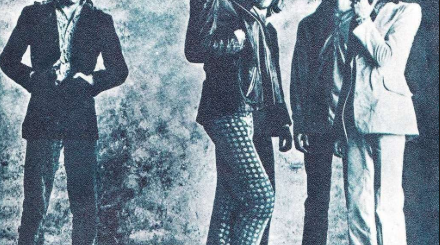Love in Vain by The Rolling Stones Lyrics Meaning – Tracing the Blues Through a Rock Lens
Lyrics
With a suitcase in my hand
Yeah, I followed her to the station
With a suitcase in my hand
Whoa, it’s hard to tell, it’s hard to tell
When all your love’s in vain
When the train, come in the station
I looked her in the eye
Well the train come in the station
And I looked her in the eye
Whoa, I felt so sad so lonesome
That I could not help but cry
When the train left the station
It had two lights on behind
Yeah, when the train left the station
It had two lights on behind
Whoa, the blue light was my baby
And the red light was my mind
All my love was in vain
All my love’s in vain
The Rolling Stones, a band never shy to explore the depths of heartache and romantic demise, present a masterclass in musical storytelling with their rendition of ‘Love in Vain.’ Originally a Robert Johnson classic, the Stones’ cover paints a vivid portrait of love lost in their signature bluesy rock style, a style entrenched in the muddy waters of existential longing and the human condition.
The track’s forlorn narrative catapults listeners into the bittersweet moment of parting, with striking imagery that echoes through the decades. But ‘Love in Vain’ is more than a tale of sorrowful goodbye; it encapsulates a timeless struggle, blending personal defeat with the inevitable push forward, replicating the emotional voyage in the soul-stirring sounds that only the Stones could perfect.
Unpacking the Heartache: The Emotional Odyssey
At the core of ‘Love in Vain’ is a simple story of loss, the universal language of love’s darker side. A man, suitcase in hand, trails his love to the train station, only to witness the departure of his heart’s desire. This narrative taps into the visceral feelings of longing and the devastating realization that love, sometimes, is not enough.
The potency of these lyrics resonates through Mick Jagger’s impassioned vocals, the audible crack in his voice more than just a sonic effect—it’s the sound of human vulnerability. This plain-spoken tale becomes an echo chamber for the listeners’ own private heartaches, a cathartic release for anyone who has eyed the horizon where love’s train vanished.
The Train Imagery: A Metaphor in Motion
The recurring motif of the train in ‘Love in Vain’ is no mere setting—it’s a living metaphor for life’s relentless march. The train, with its arrival and departure, becomes a symbol for the impermanence of love and existence. It’s not just about the emotional departure of a loved one, but also the recognition of our own transient place in this world.
Each verse steams forward with the inevitability of the train’s movement, a reminder of the inexorable passage of time. The train’s ‘two lights on behind,’ with one symbolizing his ‘baby’ and the other his mind, represents the dichotomy between what the heart wants and what the mind knows, further fueling the track’s emotive power.
From Blues Standard to Rock Anthem: A Sonic Transformation
The genius of The Rolling Stones is illuminated in their ability to take Robert Johnson’s blues standard and inject it with a rock edge so raw and natural, it feels like an original composition. Guitars weep and wail, underpinning an historical lineage from blues to rock, showcasing the band’s talent for harnessing traditional blues elements within their inimitable sound.
This marriage of genres serves to amplify the otherness of the Stones’ ‘Love in Vain,’ setting it apart from Johnson’s acoustic introspections. Their electrified version begs for the footlights of a raucous stage, even as it clings to the earthy roots of a Mississippi Delta bluesman.
The Hidden Meaning: Is Love Ever Truly Vain?
Buried beneath the apparent simplicity of lost love lies the song’s deepest question: is love in vain? While the lyrics paint an image of love’s futility, there is an implicit suggestion that the act of loving, despite its outcome, is never futile. The pain etched in each verse doubles as a testament to the profundity of having loved at all.
This undercurrent elevates ‘Love in Vain’ from a mere breakup ballad to a philosophical inquiry. The tune’s despairing narrative invites reflection on whether the agony of heartbreak is perhaps the purest evidence of love’s authenticity—a bittersweet affirmation of life’s most coveted emotion.
Memorable Lines: A Cry in the Void
Mick Jagger’s delivery of the lines ‘Whoa, it’s hard to tell, it’s hard to tell, when all your love’s in vain’ strikes a chord that reverberates in the human soul. It’s not just the words, it’s the almost tangible disillusionment they carry—a recognition of a truth as old as time, delivered through a performance that feels both timeless and immediate.
These memorable lines serve as the keystone of the song, encapsulating the torture and turmoil of recognizing the painful truth. They’re not just sung; they’re lived, they’re felt. In this lyrical moment, Jagger and the Stones capture a slice of human emotion so raw, listeners can’t help but stop and nod in silent understanding.








